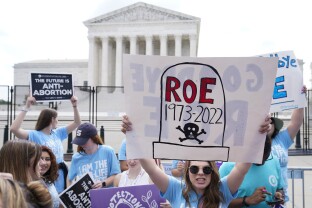Conservative Supreme Court Justices Clarence Thomas and Samuel Alito on Tuesday signaled openness to reviving the Comstock Act, a 19th-century federal law that anti-abortion advocates say can be enforced as a national abortion ban.
While hearing oral arguments for a case that could reimpose restrictions on abortion pills — Food and Drug Administration v. Alliance for Hippocratic Medicine — Thomas and Alito pressed lawyers on whether Comstock should have banned the shipment of medication abortion drugs.
Alito asked the Justice Department, which is representing the FDA, whether the agency should have “at least” considered Comstock when it allowed for abortion pills to be accessed by mail.
“This is a prominent provision; it’s not some obscure subsection of a complicated, obscure law. They knew about it; everybody in this field knew about it. Shouldn’t they have at least addressed it?” Alito asked.
A lower federal court last year ruled, in part, that the Comstock Act — which was largely unenforceable when Roe v. Wade was in place — prohibits the shipment of the two drugs used in most abortions in the U.S.
Thomas’ and Alito’s questions on Comstock stood out in the hearing because the issue of whether the act is enforceable is not part of the questions that the justices are specifically being asked to answer in this case. Instead, the justices are being asked to consider whether anti-abortion groups have actual standing to bring forth the case.
To that end, multiple justices seemed skeptical that the anti-abortion groups have sufficient legal standing. Alito’s and Thomas’ line of questioning, however, suggests that they’re interested in writing a concurring opinion addressing Comstock.
Elizabeth Prelogar, U.S. solicitor general, answered that federal law does not require that the FDA take the law into consideration and added that the agency was following 2022 guidance from the Justice Department that says that Comstock makes mailing abortion pills illegal only when “the sender intends them to be used unlawfully,” which, she argued, is not the case here.
While Alito did not press the Justice Department on their argument, Thomas turned his questions on the law to Danco Laboratories, the manufacturer of the abortion pill mifepristone. He said that the law “specifically covers drugs such as yours” and then asked how the company intended to respond to arguments that it is violating the law by shipping and advertising mifepristone.
“We disagree that that’s the correct interpretation of the statute,” said Jessica Ellsworth, the attorney representing Danco. “But we think that in order to address the correct interpretation, there would need to be a situation in which that issue was actually teed up. This statute has not been enforced for nearly 100 years, and I don’t believe that this case presents an opportunity for this court to opine on the reach of the statute.”
While Thomas did not specifically press Danco on its answer, he asked Alliance Defending Freedom, the conservative law firm representing the anti-abortion groups that brought the case, to respond to the previous arguments. Erin Hawley, ADF senior counsel, said nothing “empowers” the FDA to ignore Comstock.
“The Comstock Act says that drugs should not be mailed either through the mail or through common carriers,” Hawley argued. “So, we think that the plain text of that, Your Honor, is pretty clear.”
The Supreme Court is expected to issue a decision on this case by the summer.
Democrats in Congress are in the process of strategizing and planning legislation to weaken Comstock if the court were to ultimately argue that the law does restrict abortion in the U.S.
—
Oriana González is a reporter at NOTUS.
Sign in
Log into your free account with your email. Don’t have one?
Check your email for a one-time code.
We sent a 4-digit code to . Enter the pin to confirm your account.
New code will be available in 1:00
Let’s try this again.
We encountered an error with the passcode sent to . Please reenter your email.


